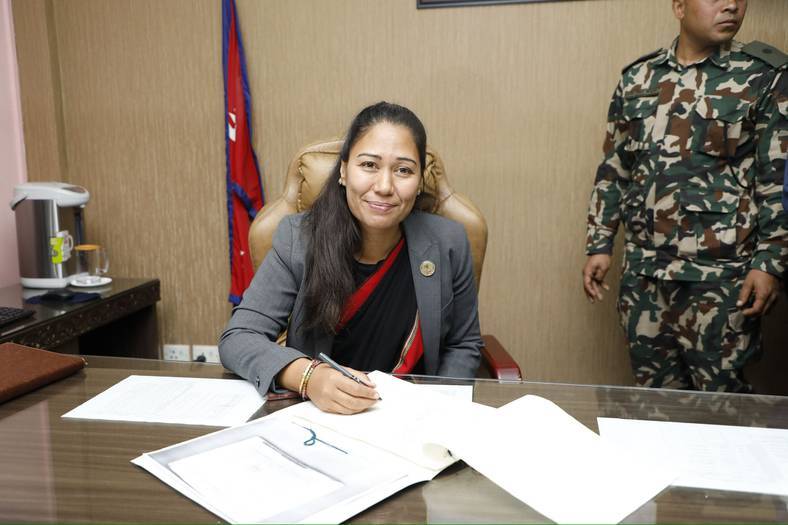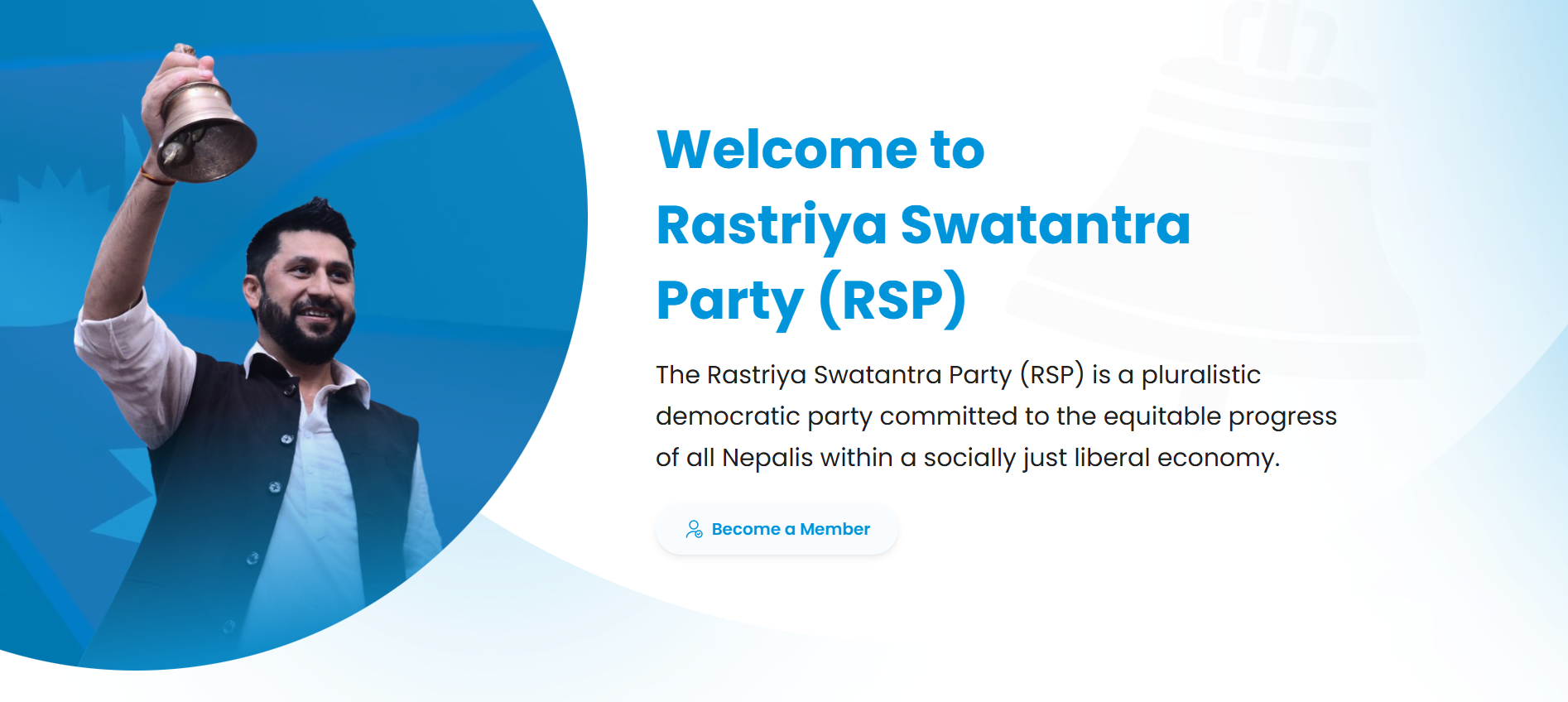

KATHMANDU: Sumana Shrestha resigned from the Rastriya Swatantra Party (RSP) on September 14. She became a Member of Parliament and then a Minister from the RSP within a short period and had been expressing dissent even within the party, demanding the rule of law and internal democracy.
Shrestha had resigned from the post of Joint General Secretary of the RSP on April 17 and announced her departure from the party on September 14, immediately following the Gen Z nationwide protest. Subsequently, she was accused of being an opportunist.
In the poem written by Shrestha called ‘Ma Awasarwadi’ (I am an Opportunist) on November 12, she attempts to refute the very accusation leveled against her. She mentions seeking good governance and the rule of law in the poem, and even while leaving the party, she had expressed dissatisfaction, stating that the RSP was beginning to place the party above the nation and the leader above the party.
Exactly two months after Shrestha left the party and two days after she wrote this poem, influential RSP leader Santosh Pariyar also quit the party on November 14. Pariyar, who had served as a Secretariat Member, Member of Parliament, and Chief Whip of the House of Representatives for the RSP, was dissatisfied with the RSP leadership following the Gen Z protest. After leaving the RSP, he joined the Pragatisheel Loktantrik Party of Janardan Sharma and Baburam Bhattarai, among others. The reason for Shrestha and Pariyar leaving the party is the same: weak internal democracy within the party.
In the expanded meeting of the RSP held in Chitwan on November 7 and 8, a call was made to hold another expanded meeting this month to prepare for the March 5, 2026 election if the regular general convention could not be held immediately. The RSP’s regular convention is, in fact, due to be held around the month of March 2026. However, since holding the convention did not seem possible due to the election announcement, there was talk of holding an expanded meeting in December to add Central Committee members and distribute other responsibilities. But no initiative was taken in that direction.

Central Office of Rastriya Swatantra Party (RSP)
Although there was discussion about making changes in the Central Working Committee and going into the election as long as party Chairman Rabi Lamichhane was not released (from judicial custody), that idea was ignored. They had been voicing the need to address internal dissent and move forward, build the party according to the needs of Nepali society, and achieve ideological clarity. However, the issues raised by Santosh Pariyar and others at the expanded meeting were not addressed. Pariyar, who became dissatisfied after that, finally resigned from the party. He says, “The RSP has failed to be the kind of party required by Nepali society, failed to have the kind of ideological clarity, and failed to raise the issues it should have. This is the RSP’s current main problem.”
Like Pariyar, former Minister Sumana Shrestha also consistently raised the issue of internal democracy within the party. She had opposed the RSP’s reliance on individuals rather than policy. After Chairman Lamichhane was arrested in the cooperative fraud case, Shrestha also raised the call for a change in leadership. She also expressed disagreement with the nationwide signature campaign run by the RSP demanding Lamichhane’s release. Shrestha claims she resigned because when she pointed out internal shortcomings for improvement, the leadership showed a tendency to say, ‘If you want to leave, then leave,’ instead of focusing on reform. She termed this the ‘Oli Tendency,’ referring to former PM K.P. Sharma Oli.
Moreover, the then RSP General Secretary Mukul Dhakal conducted interactions with leaders and workers from 39 districts and submitted a 32-page report. The report mentioned that the party’s support base was declining, and if the situation continued, it would be difficult to even remain a national party in the next election. The RSP did not accept Dhakal’s report. When he spoke publicly about the contents of the report, RSP leaders attacked him. Dhakal attended the Central Committee meeting on July 3, 2024, with black tape over his mouth, claiming his right to speak within the party was violated. On July 9, 2024, the RSP decided to remove him from the posts of general secretary, spokesperson, and Central Committee member. He says that the weakness of internal democracy is the reason why one leader after another has recently left the RSP. He says, “I said, let’s build the RSP, not Rabi’s party, but those who express dissent are kept inside a cage.”

Sumana Shrestha. File Photo
Mukul Dhakal was initially a staunch supporter of Rabi. Dhakal was one of the first people to support Rabi. However, Dhakal was dishonorably expelled from the RSP.
Recently, Central Committee member Dr. Prabhat Adhikari, Central Law Department member Dr. Narayan Ghimire, and Bharat Mani Devkota, the head of the party’s Research Commission and landlord of the RSP office, have also left the RSP.
Some leaders have been disciplined by the party for expressing dissenting views, while others have resigned because they could not stay. This trend has spread from the central level to the provincial and district levels. Jeevan Kumar Shrestha, the former Sunsari District Chairman of the RSP, says he faced disciplinary action for bringing suggestions from the ward level to the party. He, who is now just a general member, says, “It is difficult for those who speak the truth and believe the party should be democratic to stay in the RSP. The main reason for the current wave of resignations is the lack of internal democracy.”
Ideological identity remains ambiguous
Within a political party, leaders and workers are bound by ideology. Despite personal disagreements, they cannot easily quit party membership because of ideology, but the RSP is not clear on its ideology either. Hence, it is not easy to bind leaders and workers.
The ideological background of RSP leaders is diverse. For example, Chairman Rabi Lamichhane does not have a distinct ideological identity; he is a ‘populist.’ Some leaders, such as Swarnim Wagle and Manish Jha, have a Nepali Congress background. Lima Adhikari and Santosh Pariyar, among others, entered the RSP from a Communist background. There is no ideological uniformity among them.
The RSP identifies itself in its documents and on its website as a ‘pluralistic democratic party that believes in liberal economics.’ However, former General Secretary Mukul Dhakal says that there has been no serious debate on ‘ideology’ within the party. He says that when he initially raised the demand for clarity on ideology, it was ignored. He says, “I initiated a discussion on whether we should be left or right. When I suggested resolving the ideology based on the majority after internal party discussion, it was blocked. The RSP has now moved from ideology to individualism.”
The ideological background of RSP leaders is diverse. For example, Chairman Rabi Lamichhane does not have a distinct ideological identity; he is a ‘populist.’ Some leaders, such as Swarnim Wagle and Manish Jha, have a Nepali Congress background.
Sumana also repeatedly criticized the party for prioritizing individuals over ideology. She said, ‘When I raised the point that the party should not follow one individual, I was told something along the lines of, ‘If you want to leave, then leave.’ My resignation is an explosion after failing to achieve reforms from within.’
Santosh had also been advocating for ideological clarity within the party. Even after leaving the party, he complained about the lack of ideological clarity in the RSP. He expressed a similar sentiment on social media on Thursday, writing, ‘Polarization is necessary. The public should not be misled. Let’s delineate what is right and what is left. But a question to ourselves: How can women, Madhesis, Dalits, and Indigenous Nationalities possibly be right (right-wing)?’
According to Professor of Political Science Krishna Prasad Pokhrel, the RSP, a party built by capitalizing on Rabi Lamichhane’s popularity, now shows two distinct streams. He says that although they initially appeared united, two streams emerged after his arrest in the cooperative case: one that says Rabi should no longer be promoted and one that insists he must still be promoted. Prof. Pokhrel says that the party has moved forward as a liberal democratic and ‘populist’ party. Prof. Pokhrel says, “I feel that the problem within the RSP now is less about ideology and more about the two streams that are for and against Rabi. The voice of those who argue that Rabi should not be promoted seems to have been suppressed.”
Difficulty for others to coexist with the ‘G.G’
When talking to the leaders and workers who were disciplined or resigned from the RSP because they could not stay, there is one common sentence they use: ‘Good people are not allowed to stay by the G.G.’
The term ‘G.G.,’ which is famous among RSP leaders and workers, stands for the Galaxy Gang. It refers to the group of people who worked with Rabi at Galaxy Television. Those who joined later are also the key figures of the G.G. group. The G.G. group in the RSP does not allow those who express dissenting opinions against Rabi’s views or criticize him to stay. Members of the G.G. group are active in defaming them on social media and in the media. According to those who left the RSP, this group includes Deepak Bohora, Pratibha Rawal, Jwala Sangraula, DP Aryal, Kavindra Burlakoti, Bipin Acharya, Ramesh Prasai, and Krantishikha Dhital.
The RSP initially put forward the slogan, ‘Select the knowledgeable.’ After Rabi was arrested, there was also a discussion about bringing in Baburam Bhattarai and Kulman Ghising, among others. But this same group insisted that no alternative to Rabi should be considered, preventing others from joining. RSP leaders say that a faction fears being sidelined if politically astute and committed people join, so they prevent good people from coming in. Senior Advocate Dr. Narayan Ghimire, a recently resigned member of the Central Law Department, says, “The slogan ‘Select the knowledgeable’ was not reflected in the working style of the main leaders.”

Screenshot of Rastriya Swatantra Party (RSP) website
Those who left the party complain that there is a tendency within the RSP to make talented and honest people roleless, deny them roles, and benefit themselves. They claim they could not stay due to the tendency of favoring people implicated in corruption, retired, unsuccessful, or those whose public conduct is questionable, while denying opportunities to good people. Former General Secretary Dhakal also says that the group of Rabi’s former colleagues within the RSP does not allow others to stay. District Chair Jeevan Kumar Shrestha says, “They fear that if good and competent people come, those of us who suffered from the beginning will be deprived of opportunities, so they don’t let those who speak the truth stay.”
Rabi’s reverse action
The RSP leaders had been claiming that the then-government was pursuing a vendetta against Chairman Lamichhane and causing him trouble. The RSP ran a nationwide signature campaign to get Lamichhane released, alleging a vendetta. Chairman Lamichhane and the RSP were garnering sympathy through this, and public support for the RSP was growing.
RSP leaders and workers also actively participated in the Gen Z protest on September 8 and 9. Under the cover of the Gen Z protest, RSP leaders, workers, and supporters released Chairman Lamichhane from Nakkhu Prison on September 9. Lamichhane then appeared in public in a ‘sunroof’ vehicle, waving his hand in victory, and also gave a speech.
Criticism arose both inside and outside the party over Chairman Lamichhane’s victorious exit while around two dozen protestors had lost their lives, thousands were injured, and firing was still ongoing during the Gen Z protest. Inside the party, leaders like Sumana, Santosh, Dr. Toshima Karki, Ganesh Karki, and Spokesperson Manish Jha raised questions. Sumana even spoke publicly, saying, ‘The blood of children has not dried on the streets. When a leader questioned the need for a car with a sunroof, it was viewed negatively.’
The incident of Rabi being released from prison during the Gen Z protest further fueled the discontent in the RSP, which was already simmering due to weak internal democracy, ideological ambiguity, and other minor reasons. Sumana cited this as the reason for her resignation, and others who expressed dissatisfaction at that time are now also resigning.
Professor Pokhrel says, “Since it is a new party, their politics have not yet settled down. In such a situation, people leave and join when ideas do not align. It would be a bit hasty to say that the RSP is facing an existential collapse.”